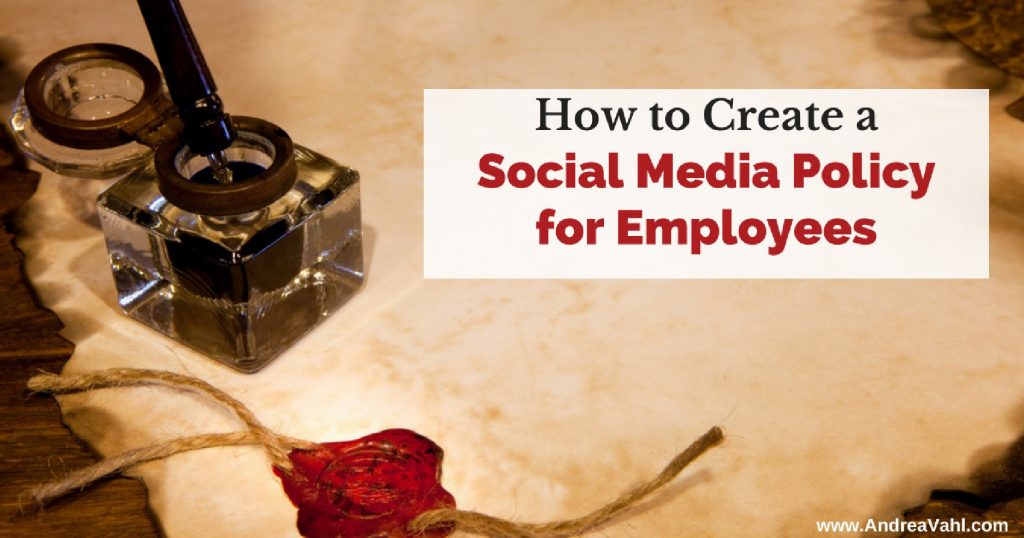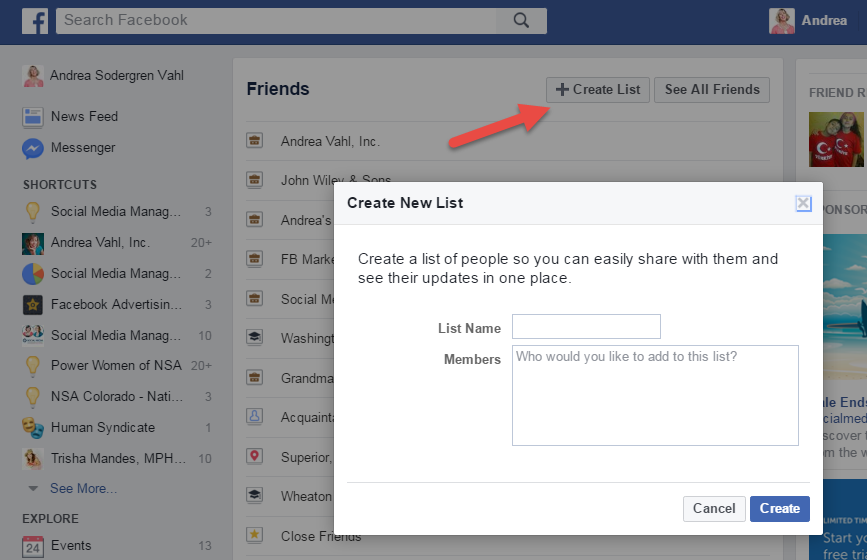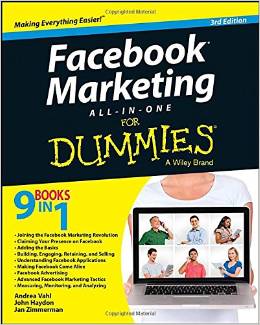We are living in some challenging times with polarizing view points politically, socially, religiously, and with regards to policies being made in our government.
We often want to express those views on social media. But in these changing times, we can be misunderstood, and occasionally post something that we should have thought through a little more as to how it might be received.
Having a social media policy in place for your company can help protect your brand but also give your employees some good guidelines on what you expect from them, as a representative of your brand.
Not only that, as an employee, you have to protect yourself from the possibility of termination due to a social post that wasn’t well thought through.
Basic Necessities of a Social Media Policy for Employees
I wrote about having a Social Media Policy for your social sites which includes what you will allow on your Facebook Page or in your online community but telling your Employees can post on their personal profiles can feel more restrictive. But it is necessary as many employees link to your brand in their profiles and thus represent you.
The best way to approach this is to have some guidelines and education around what is acceptable and have conversations with your employees to hear their feedback also.
Here are some basics that every social media policy should cover:
- Hate Speech. Make sure you clearly outline that you will not tolerate negative language or insults that are targeted by race, ethnicity, sexual orientation, religion, or physical disability.
- Company Secrets or Sensitive Information. Employees should never discuss or reveal proprietary information about the company, the employees, or the customers online or offline.
- Full disclosure that your views are your own. Many people post that their views are their own in their profiles which is a good thing but does not exempt people from adhering to some of the basic guidelines you put in place.
- Identify your affiliation with the company if you are talking about the company. Typically if you are commenting about your employer in an online discussion, it needs to be clear that you are affiliated with that company.
There are other things that you can add into the policy including what sites people can access while at work, how they can share the company news (from blog posts or press releases), and how to associate their profiles with the companies.
Also note that if you are in Healthcare your social media policy must include issues about patient privacy, endorsements, conversations about work conditions with co-workers, friending policies with patients or staff, and other issues. The Mayo Clinic has a good example of a social media policy for employees in healthcare.
There are some great posts about this that cover employee policies that I used as reference:
- Inc’s Social Media Policies which also covers a list of different policies you can create
- Social Media Examiner’s post on how to write a policy that empowers employees
- Hire Rabbit’s 5 Terrific Examples of Social Media Policies
What about Free Speech?
One of the issues that is central to this problem is Free Speech. Aren’t we able to say what we want on our personal profiles in our spare time?
The short answer is no. An American Bar article about free speech for employees states:
American employees’ free speech rights may be more accurately summarized by this paraphrase of a 1891 statement by Oliver Wendell Holmes, Jr.: “A employee may have a constitutional right to talk politics, but he has no constitutional right to be employed.” In other words: to keep your job, you often can’t say what you like.
We are in an “employment at will” model and the First Amendment only limits the government’s ability to suppress free speech. The article goes on to talk about the fact that some unions may have clauses in place but most private sector jobs do not.
Also note that some states do have some protections for employees off-duty legal activities so check your local laws and consult with a lawyer if you are in this type of situation.
How to Protect Yourself as an Employee
It is important to remember as an employee that you ALSO need to protect yourself. The list is getting longer every day of people who were fired for a tweet meant as a joke, a Facebook post gone wrong, or in some cases very real hate speech.
- Justine Saccos was fired after posting extremely insensitive racial remarks intended as a joke
- A nurse at a Philadelphia hospital was fired after a controversial Facebook Post
- An SNL writer was suspended after a tweet in extremely poor taste about Donald Trump’s son but intended as a joke
Many times people are alerting the brand or company of the employee’s posts – the SNL writer had nearly 79,000 people who signed a petition demanding that she be fired.
Recently, a friend of mine posted a political image with what was intended to be a joke but was perceived by many as rude and divisive. She is part of a large online company and there was a heated discussion on her post about whether or not this was appropriate. While she stated that it was her personal profile, the fact is, she is thought of as a part of that brand and it caused hurt feelings. The brand was contacted and she did take the post down.
We can argue all day about whether it’s right or wrong for someone to contact your employer about your personal posts but the larger issue is that that people are feeling extremely sensitive to any political posts. Both sides of the issue are feeling that the other side is belittling, bullying, and calling each other names. And they are right – I’m seeing so much negativity on both sides.
As an employee you have to think about whether that social media post is worth your job. And deleting it right away won’t always protect you in the world of screenshots.
If you have to ask yourself if the post is appropriate, then it may not be. Are you coming from a place of anger or a place of love?
When You ARE the Brand
As an employee, you may be more associated as a “brand manager” than some other employees but as shown with the nurse of the hospital, no position is safe from scrutiny (again whether this is right or wrong, I don’t have an answer).
You also have to realize what responsibility you carry since your profile can be directly tied to your employer or tied to your own business.
Some things to consider that may make your personal posts carry more weight towards being a part of the brand:
- Is the company smaller? Fewer employees may mean that you have a more customer-facing role.
- Are you creating content for that company that people associate with your personal name? This includes blogging, video, social posts, and participating as the voice of the company inside groups.
- Are you in a customer service or sales role? Customers who regularly talk to you will associate your opinions with the feeling they have for the company.
- Are you the owner? Sometimes you have more leeway as the owner because you get to decide how much you let your customers know your personal views. But realize that you may lose customers who don’t agree with your opinions if you choose to be more vocal about your personal views. That may be ok with you.
The Problem with Humor
Humor is very subjective and can cause so many problems with interpretation. I’m a stand up comedian and a little bit of a student of humor – I’m fascinated by what makes something funny.
I personally prefer self-deprecating humor when I’m saying ridiculous stuff about my self but I understand that sometimes that can be considered “playing it safe” because no one is offended.
Typically people get into trouble with making sweeping generalizations about a group of people and putting them down. Sometimes that can work if you are also a part of that group. Minorities can often talk about their own group with generalizations that people outside that minority can’t say because it would be offensive. Chris Rock has a lot of funny jokes that would NEVER fly if a white person said them.
When you are considering political humor and posting it on social media, who is going to find that joke funny? Probably people who think exactly like you do. Who might be offended by that joke? Probably people who are on the other side of that issue.
What I would recommend is only sharing those types of jokes to people who know you best and understand your intentions. Create a Friends List with a smaller group (but don’t forget the screenshot issue): https://www.facebook.com/bookmarks/lists/
Or just email the funny post to your besties if you need to share.
Final Thoughts
So what to do? Should we post things so benign so we never risk any offense? No I don’t think that’s the answer either. But maybe that’s the answer for awhile.
Let’s try, at least for awhile, to try and come together. Let’s ask ourselves, is this post going to divide or is it going to unite?
I understand that sometimes we need to take a stand on issues we are passionate about. And posting something about what you are doing about an issue (ie. I’m calling my senator, I’m marching, I’m voting, I am putting together a petition) is much less inflammatory than calling each other names.
I think as an employee and an employer we need to protect our personal brands and our company brands. I don’t think there are easy answers to how to stand for what we believe in, have a voice, and also never offend. But I do think that we all need a little more kindness and gentleness right now.
I’d love to hear your thoughts on this without this being a political discussion. Please feel free to share your respectful thoughts below.


























Thanks Andrea, for this much-needed overview! Honestly, THIS is the article that I wanted to write after that issue with our mutual friend, but didn’t have the time. Well done!
So glad it’s helpfu! I think it’s really needed in this political climate!
Great blog. Very useful information, it clarified things a lot for us. Thanks for the wonderful blog. – plunger pumps
http://www.dencilpumps.com/products/pumps/plunger-pumps.html
Very timely and very much needed as we all have strong feelings about current events. There are always spaces and places to seek out and establish for private venting while still protecting your brand and its reputation. Great post!